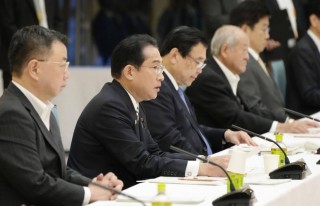Loading
Search
▼ Japan Considering ¥10,000 Monthly Benefit For High-School Age Children
- Category:Other
Japan is considering expanding its child benefits program in order to begin giving ¥10,000 per month per head to high-school age children up to 18 years old, sources said Wednesday.
As part of its efforts to combat the country's falling birthrate, the government is also preparing to double the benefits to ¥30,000 per head for families with a third child or more between the age of 3 and junior high school.
The expansion is a key policy of Prime Minister Fumio Kishida, aiming to implement "measures on a different level" to stop the birthrate from declining further. It is also part of a package of measures to be implemented intensively over the three years from April 2024.
The government will hammer out details of the planned program expansion — including whether to scrap the income limit — at the Children’s Future Strategy Council, which is chaired by Kishida.
The decision will be reflected in the government's annual basic economic and fiscal policy guidelines to be released in June.
At present, monthly benefits stand at ¥15,000 per child under 3 for families with an annual income within certain parameters.
The monthly amount for those older than 3 and before junior high school age is ¥10,000 for the first and second child and ¥15,000 for the third child and any children beyond that. For children of junior high school age, the amount is a uniform ¥10,000.
The government aims to generate ¥3 trillion annually to cover measures to battle the falling birthrate by reducing expenditures and raising social insurance premiums. Of the amount, over ¥1 trillion is expected to be spent on the expansion of child benefits.
To make up for an expected shortfall in funding to boost child-rearing support, the government is considering issuing bridge bonds as early as fiscal 2024, the sources said.
Bridge bonds are the same as deficit-covering bonds, but the government specifies in advance the funding source to repay them. For the envisaged issuance of childcare bonds, likely spanning over two years, the government is expected to use increased social insurance contributions, the sources said.
Earlier this week, the prime minister ruled out raising taxes to enhance childcare support.
While raising social insurance premiums is seen as a viable option, it will unlikely come until fiscal 2026 at the earliest, the sources said, meaning that the government would need to rely on government bonds if it wants to boost spending on childcare support during that time.
The government is planning to manage revenue from the issuance of bridge bonds in a special account to be set up in the state budget, the sources said.
The number of newborns in Japan slipped below 800,000 in 2022 for the first time since comparable data became available in 1899, due to multiple factors such as more people choosing to get married later in life than before and an increase in double-income households.
As part of its efforts to combat the country's falling birthrate, the government is also preparing to double the benefits to ¥30,000 per head for families with a third child or more between the age of 3 and junior high school.
The expansion is a key policy of Prime Minister Fumio Kishida, aiming to implement "measures on a different level" to stop the birthrate from declining further. It is also part of a package of measures to be implemented intensively over the three years from April 2024.
The government will hammer out details of the planned program expansion — including whether to scrap the income limit — at the Children’s Future Strategy Council, which is chaired by Kishida.
The decision will be reflected in the government's annual basic economic and fiscal policy guidelines to be released in June.
At present, monthly benefits stand at ¥15,000 per child under 3 for families with an annual income within certain parameters.
The monthly amount for those older than 3 and before junior high school age is ¥10,000 for the first and second child and ¥15,000 for the third child and any children beyond that. For children of junior high school age, the amount is a uniform ¥10,000.
The government aims to generate ¥3 trillion annually to cover measures to battle the falling birthrate by reducing expenditures and raising social insurance premiums. Of the amount, over ¥1 trillion is expected to be spent on the expansion of child benefits.
To make up for an expected shortfall in funding to boost child-rearing support, the government is considering issuing bridge bonds as early as fiscal 2024, the sources said.
Bridge bonds are the same as deficit-covering bonds, but the government specifies in advance the funding source to repay them. For the envisaged issuance of childcare bonds, likely spanning over two years, the government is expected to use increased social insurance contributions, the sources said.
Earlier this week, the prime minister ruled out raising taxes to enhance childcare support.
While raising social insurance premiums is seen as a viable option, it will unlikely come until fiscal 2026 at the earliest, the sources said, meaning that the government would need to rely on government bonds if it wants to boost spending on childcare support during that time.
The government is planning to manage revenue from the issuance of bridge bonds in a special account to be set up in the state budget, the sources said.
The number of newborns in Japan slipped below 800,000 in 2022 for the first time since comparable data became available in 1899, due to multiple factors such as more people choosing to get married later in life than before and an increase in double-income households.
- May 25, 2023
- Comment (0)
- Trackback(0)


